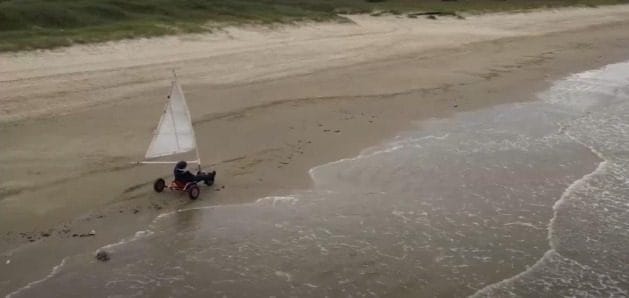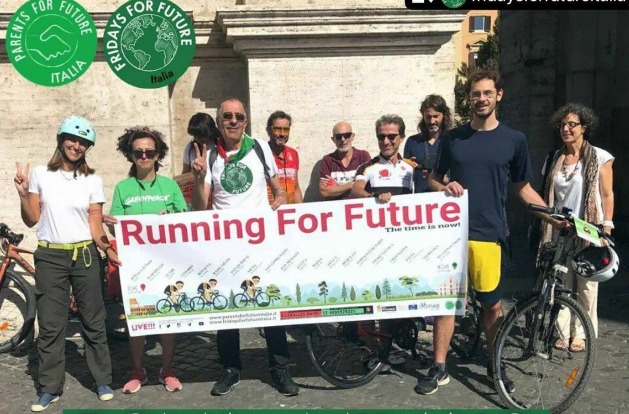Civil Society, Environment, Global, Headlines, TerraViva United Nations

Yamandú Pagliano plans to cross Praia do Cassino, the world’s longest beach, stretching 250 kilometers along Brazil’s southern coast from Uruguay, in his homemade wheeled wind buggy, to highlight the need to address global heating. Credit: Yamandú Pagliano
– Extreme sports are not just for young people. Climate activism isn’t either. Yamandù Pagliano is proof.
The 59-year-old father of two is gearing up for an epic feat. He plans to cross the longest beach on Earth, the Praia do Cassino, stretching from the border of Uruguay 250 kilometres up Brazil’s southern coastline, on his home-made wheeled wind buggy.
It’s a massive challenge both in physical and mental terms and one that brings multiple risks with it, including the danger of getting lost, crashing, or being swept out into the sea if the weather turns nasty.
But the Montevideo native has a special motive for taking it on.
Pagliano is a member of Parents for Future (PFF), a global network of citizens concerned about the climate crisis set up to support and echo the calls made by the young people of the Fridays for Future (FFF) movement.
When he takes on the Praia do Cassino challenge, he’ll be flying the Parents for Future flag on the mast of his wind buggy to highlight the need to address global heating.
“It’s going to be a PFF challenge,” Pagliano told IPS.
“My involvement in PFF started after my daughter joined FFF. Soon I was in Parents for Future Latin America (PFF LATAM) and then I helped to set up PFF Uruguay.
“I hope all the detailed stories of the crossing will help people become aware of the climate crisis, biodiversity loss and pollution. I’ll probably find dead animals and plastic garbage on the beach and face extreme weather events”.
Pagliano knows that the climate crisis is no longer a distant problem for future generations as people in Uruguay have been faced with the consequences first hand, as seen with last year’s severe drought that caused dramatic water shortages.
“In Uruguay the winters are not as cold as they used to be, and summers are a lot hotter,” he said.
“We have had big floods, with houses carried down the coast, and recently we had the biggest drought in our history, with almost no water coming out of the tap”.
Fittingly for an initiative that seeks to show the need for sustainability, Pagliano made his windcar out of reused material, welding together pipes he picked up from a scrap yard, while the sail is second-hand.
“There’ll be no phone signal in the middle section of the beach and I’ll be on my own for quite some time,” said Pagliano, who works in construction.
“I will be completely isolated. You have to be ready for every eventuality.
“Depending on the wind, it could take two or three days.
“It could take just one day with an early departure in good conditions, with the wind blowing in the perfect direction and at the perfect strength.
“It gets tiring physically after a while, but the adrenalin keeps you pumped up.
“It’s a good way to highlight the need to be sustainable.
“It’s a natural sport. There’s no contamination. No carbon footprint.
“I’ll do the crossing first and then go public if I’m successful, like Gagarin,” he quipped.
He is not the only parent harnessing renewable energy to draw attention to the need for climate action.
On the other side of the world, the Italian section of PFF is getting ready for the Running For Future, Cycling For Peace – a bike event which, fittingly for the land of the Giro d’Italia, is split into stages.
The ‘race’ starts in Rome’s Piazza del Popolo on May 10 and features 16 stages over nine days, roughly following the Via Francigena pilgrimage route southwards to end in Lecce on May 19.
Each stage will be used to focus on a specific aspect of the ecological crisis, such as air pollution, urban sprawl and the problems created by intensive livestock farming, while at the same time showing how they are all interconnected.
Organized with Fridays for Future Italia, the aims are multiple.
Among other things, organizers want to highlight the “institutional indifference” to the climate crisis at all levels of government, promote sustainable transport and tourism, draw attention to the need for more cycle paths, especially in southern Italy, and make a loud appeal for peace around the world.

The Italian section of Parents for Future gears up for “Running For Future, Cycling For Peace” — a multi-stage cycling event starting in Rome’s Piazza del Popolo on May 10th and ending in Lecce on May 19th, following the Via Francigena route. Credit: Paul Virgo
“We chose a cycling initiative because the bicycle has become a symbol of ecology,” said Maria Santarossa of Parents for Future Italia.
“It is a clean means of transport, which enables you to stay fit and be in direct contact with nature.
“We chose a pilgrims’ path because we can consider it an emblem of the beauty of nature and it’s a way to remind ourselves that we must take care of beauty.
“We have involved many other movements, associations, committees, and networks because we want people to know that many of us have the same objectives regarding the very serious climate and environmental crisis that is present in everyone’s lives”.
It is free to take part in the event, although participants have to cover their own accommodation and food expenses.
It is the second such event. The first took place in 2021, going from Rome northwards along the Via Francigena to Milan for the PreCOP26 conference that was held there.
That was such a success that it inspired the Polish section of Parents for Future to stage a climate grand tour of its own.
Each national PFF group is autonomous and does its own thing, campaigning on the issues that are most appropriate given the local situation.
PFF Italia, for example, is currently engaged in a major campaign to convince consumers to switch to utility companies whose electricity comes only from renewable sources.
There is also an umbrella group, Parents for Future Global (PFFG), which, among other things, is campaigning to support the drive for a Fossil Fuel Non-Proliferation Treaty.
